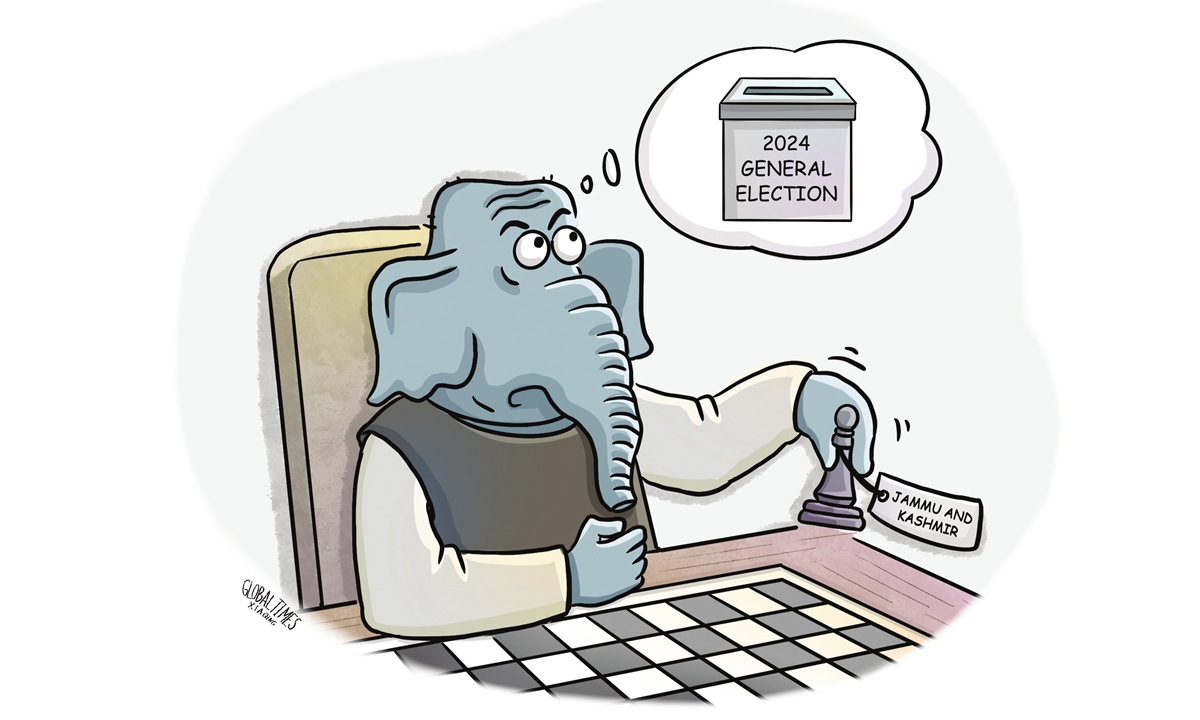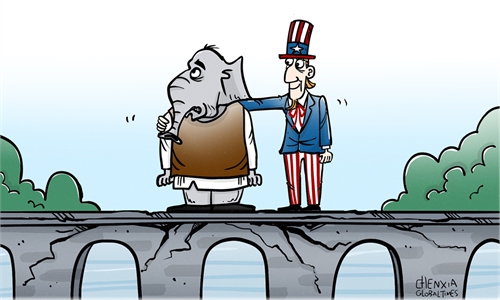
Illustration: Xia Qing/Global Times
The Supreme Court of India upheld Indian government's decision to abolish Article 370 of the Constitution on December 11, and ruled that the government acted lawfully when it revoked the autonomy of the state of Jammu and Kashmir and brought it directly under control of the center.At the same time, the ruling deemed the so-called Ladakh Union Territory, established by the Indian government in 2019, as legally valid. This ruling not only disregards the wishes and interests of the people of Jammu and Kashmir, but also overlooks the bilateral agreements and existing contradictions between India and Pakistan, as well as between China and India. Furthermore, it ignores the consensus and calls from the international community.
Pakistan firmly rejects the Supreme Court's ruling, stating that it has "no legal value" and that the international law doesn't recognize New Delhi's "unilateral and illegal actions" of August 5, 2019. The spokesperson of the Chinese Ministry of Foreign Affairs stated on December 13 that China has never recognized the so-called union territory of Ladakh set up unilaterally and illegally by India. India's domestic judicial verdict does not change the fact that the western section of the China-India border has always belonged to China. The Organization of Islamic Cooperation has also called for the resolution of the regional issue in accordance with the relevant resolutions of the United Nations Security Council.
So why did the Indian government once again unilaterally provoke the dispute over the Kashmir issue? First, it may want to take advantage of the current favorable international environment. Currently, the international strategic environment is very favorable to India. The US regards China as its biggest strategic competitor and sees India as a pillar to counterbalance China, so Washington no longer focuses on the Kashmir issue. Pakistan is facing political, economic and social crises and challenges domestically, with weak national strength resulting in a decline in its global strategic position.
Currently, India's GDP is around 11 times that of Pakistan, and the significant change in the strength of the two countries clearly favors India, with the gap between them likely to continue to widen. In addition, some Muslim countries value the Indian market and maintain friendly relations with India.
In addition, India's move may be related to the 2024 Indian general elections, with Prime Minister Narendra Modi having declared his intention for a third term. Despite leading in opinion polls, Modi faces a challenge from the opposition coalition. The main activities of the Indian government in 2023 as well as the Bharatiya Janata Party (BJP) are actually geared toward the general elections next year.
The revocation of the special status of Indian-administered Kashmir is one of the key promises of the BJP during the 2019 general elections, and the Supreme Court's decision to issue this ruling by the end of 2023 - just a few months before the general elections - is both to endorse and justify the decision of the BJP in 2019, and also to highlight Modi's tough image of practicing what he promises and consolidating his position among the domestic population, especially in the Hindi-speaking regions, to garner more support and votes.
Kashmir is an internationally recognized disputed area, and is not an issue that can be resolved by unilateral domestic legislation or by altering maps and constantly reinforcing the narrative of its ownership. India's attempts to endorse the BJP through the Supreme Court of India and to realize its objective of permanent possession by altering the demographic structure of Indian-controlled Kashmir is an act of unilateralism that places domestic laws above international law. This does not find solutions to problems, but rather creates more and more problems.
This is a great irony for India, who is striving to become a "leader of the global South" and a permanent member of the United Nations Security Council. India's constant unilateral repetition of such behavior cannot be justified and will only lead to opposition from Pakistan and the countries concerned, as well as resentment from the international community, thus resulting in deeper contradictions and fissures. The Kashmir issue, which is a historical legacy of the British colonization, can only be resolved properly and peacefully in accordance with the UN Charter, the UN Security Council resolutions and bilateral agreement.
In the recent Israel-Palestine conflict, the Indian government had initially strongly supported Israel's campaign against Hamas, reflecting its deep-seated hatred of Muslims and its disdain for disunity in Muslim countries, as it had done in the case of Kashmir. The Supreme Court's ruling will have a negative impact on the regional situation. While resolutely defending its rights and interests, China adheres to its basic position of resolving disputes through dialogue and strives to play a positive and constructive role in maintaining regional peace and stability.
The author is a scholar of international studies in Shanghai. opinion@globaltimes.com.cn



